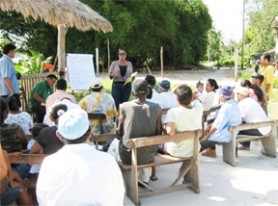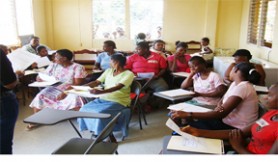Agriculture Minister Robert Persaud says his ministry is seeking to orient the national agricultural diversification strategy towards improving the living conditions of poor rural households, focusing on the empowerment of women, particularly rural women seeking to create sustainable livelihoods for themselves and their families.
Critical to the realization of this objective is the role being played by the US$6 million Rural Enterprise and Agricultural Development (READ) six-year project, which is being funded by the International Fund for Agricultural Development (IFAD) and will be implemented by the ministry’s Agricultural Sector Development Unit (ASDU) in Regions Two, Three, Four, Five, Six and Ten. READ’s project description emphasizes a particular interest in “female rural households, women-headed households, women, youth and Amerindian communities.”
Underpinned by a focus on poverty-reduction and the enhancement of beneficiaries’ human, social, organisational and financial assets, the READ project seeks to embrace small-scale agricultural producers. They should possess an average of five acres under cultivation and be dependent on farming as their major source of income. Under the project they will be involved in partnerships that seek to enhance market opportunities for their products, build capacity to produce and market non-traditional products. READ is also intended to enhance the availability of rural agro-related services to project beneficiaries, increase beneficiary access to “financial and associated capital services” and infuse into participating communities the “human and social capacity” associated with ensuring sustainable development. Its ultimate goal is to successfully tackle some of the challenges that have traditionally bedevilled small scale, low productivity, subsistence farming systems that have been confined mostly to the use of low-level technology, are labour-intensive and are generally considered to be subsistence farming pursuits.

What is perhaps most significant about the READ project is, first, the fact that it embraces agriculture as a human development tool rather than a mere money-earner. READ envisages the beneficiaries of the project will develop competencies and capabilities in the subsistence discipline of agriculture as well as in various other business-related areas including the accessing and managing of loans and the broader management of business enterprises. Secondly, READ forthrightly acknowledges the role of women as equal partners in the process.
Addressing the May 15 Annual General Meeting of the Rural Women’s Network, (RWN) a country-wide support group that seeks to mobilize women involved in various types of production, Persaud disclosed that more than US$3 million have been allocated to the promotion and support of female entrepreneurs, declaring that the “main thrust” of READ was to “empower women to take charge of their own future and that of their families”. Persaud said the project is doing so by directly supporting more than 25 women’s groups in six of the country’s ten administrative regions in several key areas including needs assessment analysis and the drafting of operational plans. The latter facility, the minister said, is designed to allow “the organisations and the individual women… to successfully conceptualise and implement their business ideas.”

What READ has done, Persaud said, is to help women upgrade their business skills. “We also recognised that together, rural women have a better chance of forming and nurturing strategic alliances with their clients and stakeholders. Therefore, we are assisting rural women in organising themselves better and providing them with support in establishing the necessary relationships with partner organisations and business,” the agriculture minister said.
The twin components of the READ project are market and rural enterprise and human and social capacity strengthening. The former component seeks to respond to what has been an oft-expressed need in the country’s agricultural sector for enhanced external market access by creating a greater awareness among producers of the nature of those markets and approaches to accessing them. Accessing new markets require, critically, strengthening capacity on the supply side including the application of effective enterprise management.
The human and social capital strengthening component of the project is divided into two sub-components, the first targeting occupational strengthening and the enhancement of the human and social capabilities of stakeholders in the rural organisations associated with the READ project. The emphasis of this sub-component is on “strengthening the rural organisations’ structure, support networks, organisational values and relationships that govern interactions among members within the organisation and among other organisations. Put differently, this component of the project, affords hitherto untrained rural individuals and groups to interact effectively with each other both as social partners and as entrepreneurs as well as to enable them to interact with other individuals and groups.
The second sub-component targets “equitable development,” promoting enhanced participation of project stakeholders in business-related decision-making and from access to those benefits that are to be derived both from service providers and from the outcomes of their collective entrepreneurial pursuits.
Under the READ project, four of the envisaged six business facilitation centres have already been built and furnished and the Ministry of Agriculture has indicated that the centres will become available to the targets during the first half of 2010. Under the human and social capital strengthening component of the programme, critical needs assessment work has already been done with over eighty rural organisations and an assessment of the progress of the project made available to this newspaper indicates that the needs assessment exercise has been able to “capture pertinent information relating to gaps that exist in the potential target organisations.” The READ project is structured to close some of these gaps as part of its end objective of enhancing the well-being of participants.









